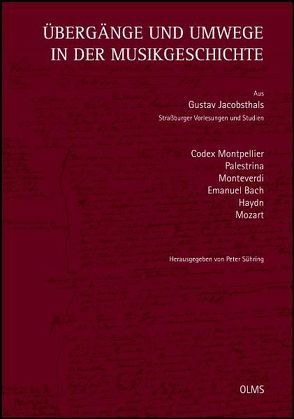
Gustav Jacobsthal (1845-1912) vertrat 33 Jahre lang die Musikwissenschaft in Forschung und Lehre an der Universität Straßburg und er hinterließ für die Entwicklung des Faches bedeutsame Studien zur europäischen Musikgeschichte. Jacobsthals Nachlass ist in der Staatsbibliothek Berlin aufbewahrt. In der vorliegenden Publikation werden erstmals grössere Teile daraus veröffentlicht. Die Aufzeichnungen wurden vom Herausgeber diplomatisch transkribiert und mit Einleitungen und umfangreichen Erläuterungen versehen.
Die Dokumente bieten einige Überraschungen: Jacobsthals Studien zum Codex Montpellier waren weit über Ansätze hinaus gediehen und geben andere Lösungen für die Gestalt der frühen Motetten als vermutet. Seine Interpretationen der Vokalpolyphonie Palestrinas geben Einblicke, die über den Horizont der „Berliner Schule“ hinausgehen. An Monteverdis Oper L’Orfeo entdeckt Jacobsthal die neuartige Ariengestaltung und Instrumentenbehandlung. Er stellt die prägende Rolle von Emanuel Bachs „Württembergischen Sonaten“ für die frühe Quartettproduktion Haydns und Mozarts vor und enthüllt die epochale Bedeutung von Mozarts Oper Idomeneo für die Überwindung der opera seria.
***
Gustav Jacobsthal (1845-1912) was for 33 years the major figure in the study and teaching of music at the University of Strasbourg, and he left behind him a body of work on the history of European music which was of great significance in the history of the discipline. Jacobsthal’s archive is held by the State Library in Berlin. Major parts of it are published here for the first time. Jacobsthal’s manuscripts have been exactly transcribed by the editor, who also provides introductions and comprehensive notes.
The documents offer some surprises: Jacobsthal’s studies of the Codex Montpellier went far beyond the basics and suggest alternatives to the usual solutions for the form of the early motets. His interpretations of Palestrina’s vocal polyphony offer new insights which go beyond the horizons of the ‘Berlin School’. Jacobsthal discovers new forms of aria and instrumentation in Monteverdi’s L’Orfeo. He demonstrates the seminal role of Emanuel Bach’s “Württemberg Sonatas” for the early quartets of Haydn and Mozart, and reveals the epoch-making significance of Mozart’s Idomeneo in transcending the genre of opera seria.
The editor, Peter Sühring, was born in Berlin in 1946. He studied Music, Literature and Philosophy in Tübingen and Berlin and obtained his doctorate with a thesis on Mozart’s earliest operas. He lives and works in Berlin as a music historian and writer and has published works not only on Jacobsthal, whose papers he continues to edit, but also on the musical ideas of the French Enlightenment, on Mozart, Schumann and Heine, Spitta and Kretzschmar.
Aktualisiert: 2023-06-30
> findR *
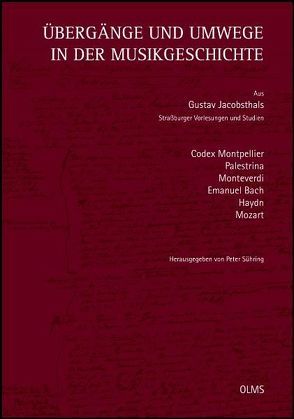
Gustav Jacobsthal (1845-1912) vertrat 33 Jahre lang die Musikwissenschaft in Forschung und Lehre an der Universität Straßburg und er hinterließ für die Entwicklung des Faches bedeutsame Studien zur europäischen Musikgeschichte. Jacobsthals Nachlass ist in der Staatsbibliothek Berlin aufbewahrt. In der vorliegenden Publikation werden erstmals grössere Teile daraus veröffentlicht. Die Aufzeichnungen wurden vom Herausgeber diplomatisch transkribiert und mit Einleitungen und umfangreichen Erläuterungen versehen.
Die Dokumente bieten einige Überraschungen: Jacobsthals Studien zum Codex Montpellier waren weit über Ansätze hinaus gediehen und geben andere Lösungen für die Gestalt der frühen Motetten als vermutet. Seine Interpretationen der Vokalpolyphonie Palestrinas geben Einblicke, die über den Horizont der „Berliner Schule“ hinausgehen. An Monteverdis Oper L’Orfeo entdeckt Jacobsthal die neuartige Ariengestaltung und Instrumentenbehandlung. Er stellt die prägende Rolle von Emanuel Bachs „Württembergischen Sonaten“ für die frühe Quartettproduktion Haydns und Mozarts vor und enthüllt die epochale Bedeutung von Mozarts Oper Idomeneo für die Überwindung der opera seria.
***
Gustav Jacobsthal (1845-1912) was for 33 years the major figure in the study and teaching of music at the University of Strasbourg, and he left behind him a body of work on the history of European music which was of great significance in the history of the discipline. Jacobsthal’s archive is held by the State Library in Berlin. Major parts of it are published here for the first time. Jacobsthal’s manuscripts have been exactly transcribed by the editor, who also provides introductions and comprehensive notes.
The documents offer some surprises: Jacobsthal’s studies of the Codex Montpellier went far beyond the basics and suggest alternatives to the usual solutions for the form of the early motets. His interpretations of Palestrina’s vocal polyphony offer new insights which go beyond the horizons of the ‘Berlin School’. Jacobsthal discovers new forms of aria and instrumentation in Monteverdi’s L’Orfeo. He demonstrates the seminal role of Emanuel Bach’s “Württemberg Sonatas” for the early quartets of Haydn and Mozart, and reveals the epoch-making significance of Mozart’s Idomeneo in transcending the genre of opera seria.
The editor, Peter Sühring, was born in Berlin in 1946. He studied Music, Literature and Philosophy in Tübingen and Berlin and obtained his doctorate with a thesis on Mozart’s earliest operas. He lives and works in Berlin as a music historian and writer and has published works not only on Jacobsthal, whose papers he continues to edit, but also on the musical ideas of the French Enlightenment, on Mozart, Schumann and Heine, Spitta and Kretzschmar.
Aktualisiert: 2023-06-30
> findR *
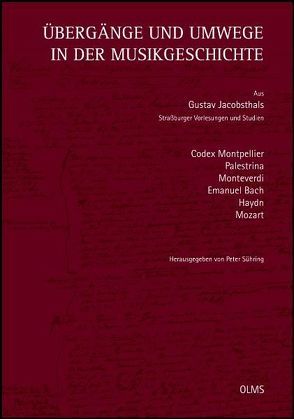
Gustav Jacobsthal (1845-1912) vertrat 33 Jahre lang die Musikwissenschaft in Forschung und Lehre an der Universität Straßburg und er hinterließ für die Entwicklung des Faches bedeutsame Studien zur europäischen Musikgeschichte. Jacobsthals Nachlass ist in der Staatsbibliothek Berlin aufbewahrt. In der vorliegenden Publikation werden erstmals grössere Teile daraus veröffentlicht. Die Aufzeichnungen wurden vom Herausgeber diplomatisch transkribiert und mit Einleitungen und umfangreichen Erläuterungen versehen.
Die Dokumente bieten einige Überraschungen: Jacobsthals Studien zum Codex Montpellier waren weit über Ansätze hinaus gediehen und geben andere Lösungen für die Gestalt der frühen Motetten als vermutet. Seine Interpretationen der Vokalpolyphonie Palestrinas geben Einblicke, die über den Horizont der „Berliner Schule“ hinausgehen. An Monteverdis Oper L’Orfeo entdeckt Jacobsthal die neuartige Ariengestaltung und Instrumentenbehandlung. Er stellt die prägende Rolle von Emanuel Bachs „Württembergischen Sonaten“ für die frühe Quartettproduktion Haydns und Mozarts vor und enthüllt die epochale Bedeutung von Mozarts Oper Idomeneo für die Überwindung der opera seria.
***
Gustav Jacobsthal (1845-1912) was for 33 years the major figure in the study and teaching of music at the University of Strasbourg, and he left behind him a body of work on the history of European music which was of great significance in the history of the discipline. Jacobsthal’s archive is held by the State Library in Berlin. Major parts of it are published here for the first time. Jacobsthal’s manuscripts have been exactly transcribed by the editor, who also provides introductions and comprehensive notes.
The documents offer some surprises: Jacobsthal’s studies of the Codex Montpellier went far beyond the basics and suggest alternatives to the usual solutions for the form of the early motets. His interpretations of Palestrina’s vocal polyphony offer new insights which go beyond the horizons of the ‘Berlin School’. Jacobsthal discovers new forms of aria and instrumentation in Monteverdi’s L’Orfeo. He demonstrates the seminal role of Emanuel Bach’s “Württemberg Sonatas” for the early quartets of Haydn and Mozart, and reveals the epoch-making significance of Mozart’s Idomeneo in transcending the genre of opera seria.
The editor, Peter Sühring, was born in Berlin in 1946. He studied Music, Literature and Philosophy in Tübingen and Berlin and obtained his doctorate with a thesis on Mozart’s earliest operas. He lives and works in Berlin as a music historian and writer and has published works not only on Jacobsthal, whose papers he continues to edit, but also on the musical ideas of the French Enlightenment, on Mozart, Schumann and Heine, Spitta and Kretzschmar.
Aktualisiert: 2023-06-30
> findR *
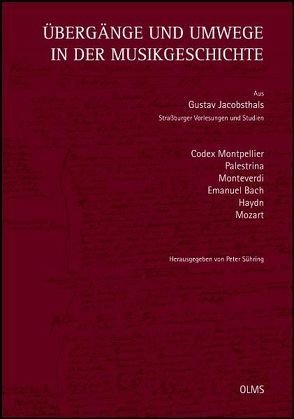
Gustav Jacobsthal (1845-1912) vertrat 33 Jahre lang die Musikwissenschaft in Forschung und Lehre an der Universität Straßburg und er hinterließ für die Entwicklung des Faches bedeutsame Studien zur europäischen Musikgeschichte. Jacobsthals Nachlass ist in der Staatsbibliothek Berlin aufbewahrt. In der vorliegenden Publikation werden erstmals grössere Teile daraus veröffentlicht. Die Aufzeichnungen wurden vom Herausgeber diplomatisch transkribiert und mit Einleitungen und umfangreichen Erläuterungen versehen.
Die Dokumente bieten einige Überraschungen: Jacobsthals Studien zum Codex Montpellier waren weit über Ansätze hinaus gediehen und geben andere Lösungen für die Gestalt der frühen Motetten als vermutet. Seine Interpretationen der Vokalpolyphonie Palestrinas geben Einblicke, die über den Horizont der „Berliner Schule“ hinausgehen. An Monteverdis Oper L’Orfeo entdeckt Jacobsthal die neuartige Ariengestaltung und Instrumentenbehandlung. Er stellt die prägende Rolle von Emanuel Bachs „Württembergischen Sonaten“ für die frühe Quartettproduktion Haydns und Mozarts vor und enthüllt die epochale Bedeutung von Mozarts Oper Idomeneo für die Überwindung der opera seria.
***
Gustav Jacobsthal (1845-1912) was for 33 years the major figure in the study and teaching of music at the University of Strasbourg, and he left behind him a body of work on the history of European music which was of great significance in the history of the discipline. Jacobsthal’s archive is held by the State Library in Berlin. Major parts of it are published here for the first time. Jacobsthal’s manuscripts have been exactly transcribed by the editor, who also provides introductions and comprehensive notes.
The documents offer some surprises: Jacobsthal’s studies of the Codex Montpellier went far beyond the basics and suggest alternatives to the usual solutions for the form of the early motets. His interpretations of Palestrina’s vocal polyphony offer new insights which go beyond the horizons of the ‘Berlin School’. Jacobsthal discovers new forms of aria and instrumentation in Monteverdi’s L’Orfeo. He demonstrates the seminal role of Emanuel Bach’s “Württemberg Sonatas” for the early quartets of Haydn and Mozart, and reveals the epoch-making significance of Mozart’s Idomeneo in transcending the genre of opera seria.
The editor, Peter Sühring, was born in Berlin in 1946. He studied Music, Literature and Philosophy in Tübingen and Berlin and obtained his doctorate with a thesis on Mozart’s earliest operas. He lives and works in Berlin as a music historian and writer and has published works not only on Jacobsthal, whose papers he continues to edit, but also on the musical ideas of the French Enlightenment, on Mozart, Schumann and Heine, Spitta and Kretzschmar.
Aktualisiert: 2023-06-29
> findR *
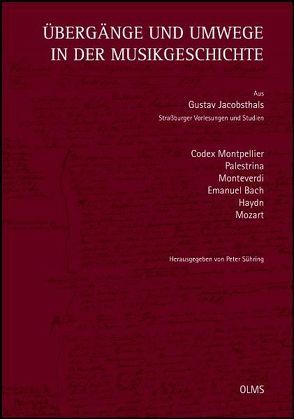
Gustav Jacobsthal (1845-1912) vertrat 33 Jahre lang die Musikwissenschaft in Forschung und Lehre an der Universität Straßburg und er hinterließ für die Entwicklung des Faches bedeutsame Studien zur europäischen Musikgeschichte. Jacobsthals Nachlass ist in der Staatsbibliothek Berlin aufbewahrt. In der vorliegenden Publikation werden erstmals grössere Teile daraus veröffentlicht. Die Aufzeichnungen wurden vom Herausgeber diplomatisch transkribiert und mit Einleitungen und umfangreichen Erläuterungen versehen.
Die Dokumente bieten einige Überraschungen: Jacobsthals Studien zum Codex Montpellier waren weit über Ansätze hinaus gediehen und geben andere Lösungen für die Gestalt der frühen Motetten als vermutet. Seine Interpretationen der Vokalpolyphonie Palestrinas geben Einblicke, die über den Horizont der „Berliner Schule“ hinausgehen. An Monteverdis Oper L’Orfeo entdeckt Jacobsthal die neuartige Ariengestaltung und Instrumentenbehandlung. Er stellt die prägende Rolle von Emanuel Bachs „Württembergischen Sonaten“ für die frühe Quartettproduktion Haydns und Mozarts vor und enthüllt die epochale Bedeutung von Mozarts Oper Idomeneo für die Überwindung der opera seria.
***
Gustav Jacobsthal (1845-1912) was for 33 years the major figure in the study and teaching of music at the University of Strasbourg, and he left behind him a body of work on the history of European music which was of great significance in the history of the discipline. Jacobsthal’s archive is held by the State Library in Berlin. Major parts of it are published here for the first time. Jacobsthal’s manuscripts have been exactly transcribed by the editor, who also provides introductions and comprehensive notes.
The documents offer some surprises: Jacobsthal’s studies of the Codex Montpellier went far beyond the basics and suggest alternatives to the usual solutions for the form of the early motets. His interpretations of Palestrina’s vocal polyphony offer new insights which go beyond the horizons of the ‘Berlin School’. Jacobsthal discovers new forms of aria and instrumentation in Monteverdi’s L’Orfeo. He demonstrates the seminal role of Emanuel Bach’s “Württemberg Sonatas” for the early quartets of Haydn and Mozart, and reveals the epoch-making significance of Mozart’s Idomeneo in transcending the genre of opera seria.
The editor, Peter Sühring, was born in Berlin in 1946. He studied Music, Literature and Philosophy in Tübingen and Berlin and obtained his doctorate with a thesis on Mozart’s earliest operas. He lives and works in Berlin as a music historian and writer and has published works not only on Jacobsthal, whose papers he continues to edit, but also on the musical ideas of the French Enlightenment, on Mozart, Schumann and Heine, Spitta and Kretzschmar.
Aktualisiert: 2023-06-29
> findR *
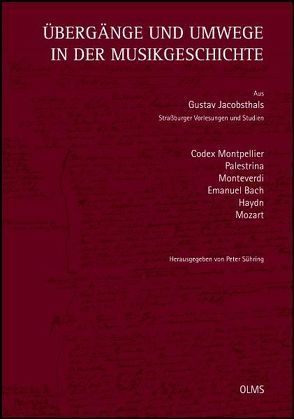
Gustav Jacobsthal (1845-1912) vertrat 33 Jahre lang die Musikwissenschaft in Forschung und Lehre an der Universität Straßburg und er hinterließ für die Entwicklung des Faches bedeutsame Studien zur europäischen Musikgeschichte. Jacobsthals Nachlass ist in der Staatsbibliothek Berlin aufbewahrt. In der vorliegenden Publikation werden erstmals grössere Teile daraus veröffentlicht. Die Aufzeichnungen wurden vom Herausgeber diplomatisch transkribiert und mit Einleitungen und umfangreichen Erläuterungen versehen.
Die Dokumente bieten einige Überraschungen: Jacobsthals Studien zum Codex Montpellier waren weit über Ansätze hinaus gediehen und geben andere Lösungen für die Gestalt der frühen Motetten als vermutet. Seine Interpretationen der Vokalpolyphonie Palestrinas geben Einblicke, die über den Horizont der „Berliner Schule“ hinausgehen. An Monteverdis Oper L’Orfeo entdeckt Jacobsthal die neuartige Ariengestaltung und Instrumentenbehandlung. Er stellt die prägende Rolle von Emanuel Bachs „Württembergischen Sonaten“ für die frühe Quartettproduktion Haydns und Mozarts vor und enthüllt die epochale Bedeutung von Mozarts Oper Idomeneo für die Überwindung der opera seria.
***
Gustav Jacobsthal (1845-1912) was for 33 years the major figure in the study and teaching of music at the University of Strasbourg, and he left behind him a body of work on the history of European music which was of great significance in the history of the discipline. Jacobsthal’s archive is held by the State Library in Berlin. Major parts of it are published here for the first time. Jacobsthal’s manuscripts have been exactly transcribed by the editor, who also provides introductions and comprehensive notes.
The documents offer some surprises: Jacobsthal’s studies of the Codex Montpellier went far beyond the basics and suggest alternatives to the usual solutions for the form of the early motets. His interpretations of Palestrina’s vocal polyphony offer new insights which go beyond the horizons of the ‘Berlin School’. Jacobsthal discovers new forms of aria and instrumentation in Monteverdi’s L’Orfeo. He demonstrates the seminal role of Emanuel Bach’s “Württemberg Sonatas” for the early quartets of Haydn and Mozart, and reveals the epoch-making significance of Mozart’s Idomeneo in transcending the genre of opera seria.
The editor, Peter Sühring, was born in Berlin in 1946. He studied Music, Literature and Philosophy in Tübingen and Berlin and obtained his doctorate with a thesis on Mozart’s earliest operas. He lives and works in Berlin as a music historian and writer and has published works not only on Jacobsthal, whose papers he continues to edit, but also on the musical ideas of the French Enlightenment, on Mozart, Schumann and Heine, Spitta and Kretzschmar.
Aktualisiert: 2019-11-18
> findR *
MEHR ANZEIGEN
Bücher zum Thema Emanuel Bach
Sie suchen ein Buch über Emanuel Bach? Bei Buch findr finden Sie eine große Auswahl Bücher zum
Thema Emanuel Bach. Entdecken Sie neue Bücher oder Klassiker für Sie selbst oder zum Verschenken. Buch findr
hat zahlreiche Bücher zum Thema Emanuel Bach im Sortiment. Nehmen Sie sich Zeit zum Stöbern und finden Sie das
passende Buch für Ihr Lesevergnügen. Stöbern Sie durch unser Angebot und finden Sie aus unserer großen Auswahl das
Buch, das Ihnen zusagt. Bei Buch findr finden Sie Romane, Ratgeber, wissenschaftliche und populärwissenschaftliche
Bücher uvm. Bestellen Sie Ihr Buch zum Thema Emanuel Bach einfach online und lassen Sie es sich bequem nach
Hause schicken. Wir wünschen Ihnen schöne und entspannte Lesemomente mit Ihrem Buch.
Emanuel Bach - Große Auswahl Bücher bei Buch findr
Bei uns finden Sie Bücher beliebter Autoren, Neuerscheinungen, Bestseller genauso wie alte Schätze. Bücher zum
Thema Emanuel Bach, die Ihre Fantasie anregen und Bücher, die Sie weiterbilden und Ihnen wissenschaftliche
Fakten vermitteln. Ganz nach Ihrem Geschmack ist das passende Buch für Sie dabei. Finden Sie eine große Auswahl
Bücher verschiedenster Genres, Verlage, Autoren bei Buchfindr:
Sie haben viele Möglichkeiten bei Buch findr die passenden Bücher für Ihr Lesevergnügen zu entdecken. Nutzen Sie
unsere Suchfunktionen, um zu stöbern und für Sie interessante Bücher in den unterschiedlichen Genres und Kategorien
zu finden. Unter Emanuel Bach und weitere Themen und Kategorien finden Sie schnell und einfach eine Auflistung
thematisch passender Bücher. Probieren Sie es aus, legen Sie jetzt los! Ihrem Lesevergnügen steht nichts im Wege.
Nutzen Sie die Vorteile Ihre Bücher online zu kaufen und bekommen Sie die bestellten Bücher schnell und bequem
zugestellt. Nehmen Sie sich die Zeit, online die Bücher Ihrer Wahl anzulesen, Buchempfehlungen und Rezensionen zu
studieren, Informationen zu Autoren zu lesen. Viel Spaß beim Lesen wünscht Ihnen das Team von Buchfindr.





